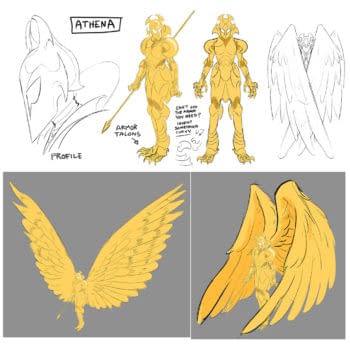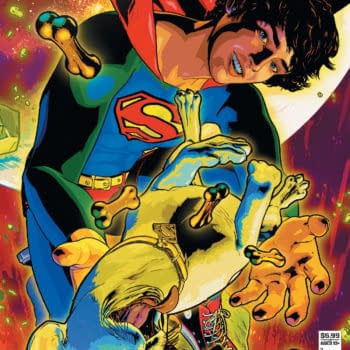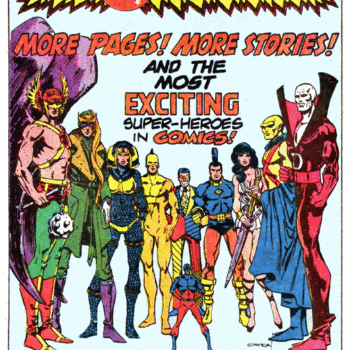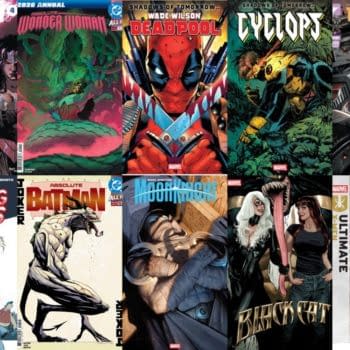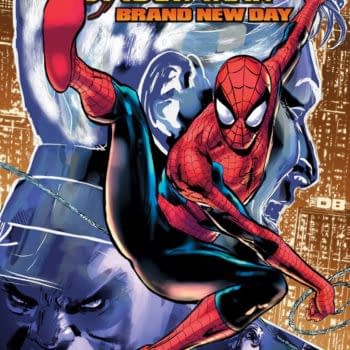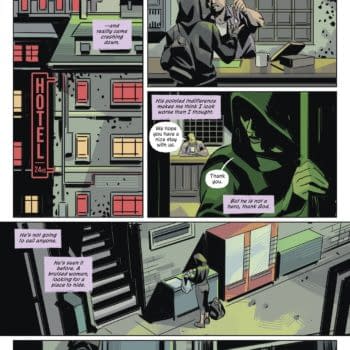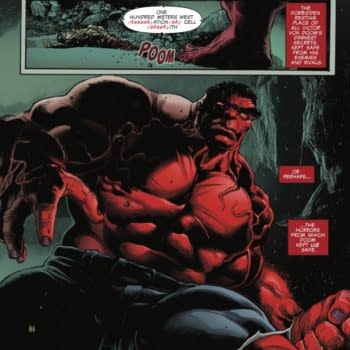Posted in: Comics | Tagged: bleeding cool magazine, Comics, conner, entertainment, jimmy palmiott amanda
Bleeding Cool Talks To Jimmy Palmiotti And Amanda Conner – The Extra Cuts
 In the most recent issue of Bleeding Cool Magazine, I interviewed Jimmy Palmotti and Amanda Conner about their current work.
In the most recent issue of Bleeding Cool Magazine, I interviewed Jimmy Palmotti and Amanda Conner about their current work.
Thousands of words later, we ran out of room as we butted up to Alan Moore talking about Providence. So here are a few choice cuts of what didn't end up in the magazine…
Rich Johnston: Jimmy, your history in comic books seems to have been as a bit of an outlier. Is that accurate?
Jimmy Palmiotti: I think it may seem like that on some levels, and at the same time I am knee deep within the system as well, so I am able to maneuver the way I want. I understand the limitations of the people I work for and at the same time I'm a bit of a dreamer and do my own thing. It takes a lot of balance, confidence and learning on a curve, but I feel so far, so good. I have a lot of ambitions, and with that comes the understanding that what I want may not be easily fulfilled. I've been offered just about every job imaginable in the business, but I can see the traps each and every one of these jobs brings with them. I have friends that run big companies and I see the stress and frustration they carry with them every day and take note of this. Until these companies look at their talent, what they can do, and apply them into the other stages of their IP development, I won't be giving too much away to anyone.
RJ: Your comics have often featured sexuality heavily, from the dark comedy of The Pro, the lighter comedy of Power Girl to the frankly disturbing realities of Queen Crab. Overt sexuality has often been prominent since the earliest pulp adventures, and has often caused ructions, but it seems even more today, and from the liberal rather than the conservative side. Is this new prudity going to be the norm or increase and how will this affect your work?
JP: I always stay true to my characters. My job is to give them individual voices and then let them run wild. A person's sexuality is part of them and I have never been one to shy away from it. Since we put Painkiller Jane out in 1994, to us, Jane has always been a bi-sexual character and is portrayed that way at all times. With Queen Crab, her sexuality got her in a lot of hot water, and to tell the story of this girls voyage, this was a key to her personality and in a way, to her survival. With Power Girl, we felt that changing her visually was a cheat and rather than doing that, we just dug in and built up Karen's personality. Like with Harley, we gave her a purpose, a job, new friends and a new place to live. We empowered the girl out of the costume to take control of her life. A lot of what people see as comedy is just us observing how ridiculous superheroes can be in the real world. The Pro was a perfect and over the top commentary on that, but in the end, we love these characters and that always comes through.
Amanda Conner: It does seem as though there is a lot more intolerance when it comes to building up or addressing a character's sexuality, or even sexiness. Or it's possible that those who have anger about it are the loudest. I don't believe that every character or storyline out there has to address these things, but I do believe that there is room for those that do.
For a long time, I've loved creating and drawing and working on characters and storylines that are considered politically incorrect. I really enjoy "poking the bear" so to speak. It may have been a knee-jerk reaction to being considered "that Barbie artist" all those years ago, and the reaction hasn't worn off, but more likely it's from my dad raising me on Mad Magazine for my entire childhood.
As far as what you asked about the new prudity, it will probably make me push back. It's so ironic! When I first started working in comics, I was unembarrassed to tell anyone who asked what I did for a living. For example, I remember having an older woman reacting scornfully to what I did. She said something along the lines of "What you're doing is much too sexy for children!" and then I'd have to explain that not all comics were for children. Oddly, sometimes people would get even more offended at the idea that grown-ups were reading comics.
Now that I'm a little older, it seems like I'm upsetting all brand new people. Now, I know it's not that lady from all those years ago. I'm pretty sure she's not reading comics and tweeting about them, so my guess is now I'm angering people who are my age or younger. Yikes. I think I've spent my whole career pissing people off.
RJ: Talking of creator issue Amanda, it's been a while since the completion of the critically acclaimed Silk Spectre but it seems like DC are very much moving on from the whole Before Watchmen line. How did you find the experience, and have you any observations on the book you created and the way it was received, the Before Watchmen line and the controversy that accompanied it, in retrospect?
AP: That book was one of the hardest projects I'd ever worked on. I became obsessed with making sure everything worked seamlessly with the original book, and that the whole book really felt like California in the '60s. I enjoyed doing that book tremendously, but I'm also glad it's over, because I became quite obsessive over the details.
I didn't even realize there was controversy surrounding it until Jimmy and Darwyn Cooke had mentioned it, because I tend to stay off the message boards and don't check my tweets regularly at all. That's how I usually find out I've angered readers. Someone on Twitter or the message boards has to physically tell me.
That's me… pissing people off again!
Bleeding Cool Magazine #16 can be found in all good comic stores, a couple of bad ones, and on eBay.







